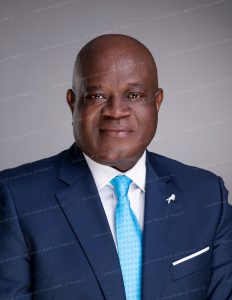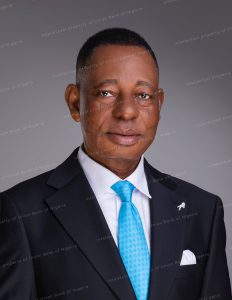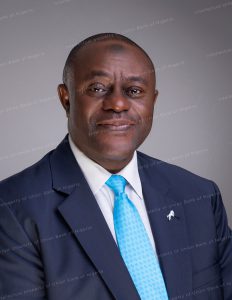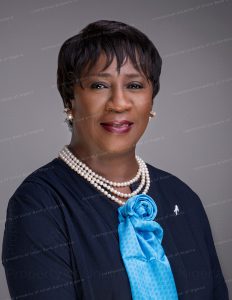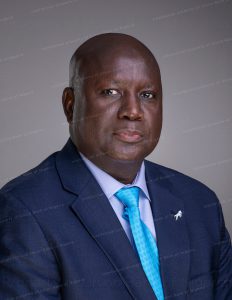Introduction
Distinguished shareholders, ladies and gentlemen. On behalf of the Board of Union Bank of Nigeria (“Union Bank” or “The Bank”), it is my pleasure to welcome you all to this year’s Annual General Meeting.
I hereby present the operating results and key achievements of our Bank for the financial year ended December 2019.
The Global Landscape
The global economy weakened from 3.7% in 2018 to 2.9% in 2019 according to the International Monetary Fund (IMF) as a result of trade tensions, civil unrest and weak investment sentiments.
The United States (US) economy grew at an annual rate of 2.3%, weaker than 2.9% recorded in 2018. Consumer spending was the main driver of growth while the lagging effects of tighter monetary policy and trade uncertainties weighed down growth.
The United Kingdom (UK) officially left the European Union after 47 years of membership and more than three years after it voted to do so in a referendum. As a result, the UK economy ended 2019 with a marginal growth of 1% largely driven by pressure from the long-term uncertainty from Brexit, mounting business costs, and a global economic slowdown.
In the emerging markets, the Chinese economy grew by 6.1% in 2019 compared to 6.6% in 2018. The US-China trade war continued throughout 2019, however, a Phase 1 deal was signed in January 2020. The deal is expected to ease trade tensions between the two largest global economies.
Sub-Saharan Africa grew by an estimated 2.6% in 2019, a slight improvement from 2.5% in 2018 according to the World Bank. The slower-than-expected overall growth in 2019 reflects ongoing global uncertainty, domestic macroeconomic instability, and political and regulatory uncertainties within the region. Smaller economies witnessed stronger performance as four of the fastest growing economies in the world in 2019 came from Africa – Cote d’Ivoire, Ethiopia, Ghana, and Rwanda. On the other hand, recovery in Nigeria, Angola, and South Africa remained fragile.
The Africa Continental Free Trade Agreement (AfCFTA) aimed at expanding intra-African trade was advanced in 2019 with 54 of the 55 African Union (AU) member states (Eritrea being the only exception) signing the deal. Egypt, Ghana, Kenya, and South Africa are some of the 28 member states that ratified the deal in 2019.
Prior to the outbreak of the COVID-19 global pandemic which began at the end of 2019, the International Monetary Fund (IMF) projected global growth would improve to 3.3% in 2020 from the 2.9% in 2019. Given the current global shutdown of businesses, borders and economies, a severe contraction of the global economy is all but a foregone conclusion.
The Nigerian Economy
On the domestic front, Nigeria’s Gross Domestic Product (GDP) grew by 2.3% in 2019 compared to 1.9% in 2018. In the fourth quarter of 2019, the economy witnessed its strongest quarterly expansion since the third quarter of 2015, driven largely by the non-oil sector.
Oil prices remained volatile throughout the year from ~$57 per barrel to ~$67 per barrel impacting Federal Government earnings alongside OPEC’s cut on Nigeria’s output from 1.9mbpd to 1.7mbpd. Headline inflation rate moderated to a 43-month low of 11% in August 2019 due to tighter monetary policy but ended the year slightly under 12% largely attributed to the increased prices of food items due to the land border closure which took effect in August 2019. On average, inflation rate was 11.4% in 2019 compared to 12.2% in 2018.
A review of exchange rates indicated that the Naira depreciated 0.1% year-on-year to N364.5/$ at the Importer and Exporter (I&E) window, parallel market rates appreciated by 0.1% year-on-year to N360.5/$ and remained flat at N307.0/$ at the official window.
2019 saw the re-election of President Muhammadu Buhari in the presidential elections which held in February. The economy was off to a slow start at the beginning of the year due to the uncertainties and tensions usually associated with elections.
In March 2019, the Monetary Policy Committee (MPC) reduced the monetary policy rate to 13.5% from 14% with the rate remaining unchanged for the rest of the year. Liquidity Ratio and Cash Reserve Ratio (CRR) were kept at 30% and 22.5% respectively. The Central Bank of Nigeria (CBN) also raised the Loan to Deposit Ratio (LDR) for deposit money banks twice during the year to 60% in July and 65% in September 2019 to boost lending to the real sector. President Buhari also inaugurated the Economic Advisory Council in September 2019 to chart policy direction on fiscal analysis and economic growth.
Other notable events that occurred during the year include:
- Minimum wage increase: In April 2019, President Buhari signed into law the Minimum Wage Repeal and Re-enactment Act 2019, raising minimum wage from N18,000 to N30,000.
- CBN Governor re-appointed: In May 2019, Godwin Emefiele was reinstated as the CBN Governor for another five years. He unveiled a five-year monetary policy roadmap focused on achieving single digit inflation, double digit GDP growth and recapitalisation of banks.
- Improved ranking in Nigeria’s ease of doing business: Nigeria’s ranking improved to 131 out of 190 countries on the World Bank Doing Business Index, moving up 15 places from 146th position in the 2018 report.
- Prompt passage of the 2020 Budget: President Buhari presented the N10.6 trillion 2020 appropriation budget to the National Assembly in October 2019. The budget was passed by the National Assembly in December 2019.
- Rating agency changes on Nigeria’s outlook: In December 2019, Moody’s Investor Services and Fitch Ratings revised their outlook on Nigeria’s sovereign credit rating to “negative” from “stable”, citing increasing risks to the government’s fiscal strength and external position.
Our Bank
In line with the Bank’s mission to make lives better by delivering the simplest, smartest solutions every time, we remained focused on delivering results and improving our service offerings to the market. This led to several achievements during the year, including:
Launch of αlpher, our women’s proposition
In celebration of the 2019 International Women’s Day, we introduced our women’s proposition, αlpher via a soft launch to the market. αlpher caters to the needs of women-owned and women-led businesses. This proposition offers access to finance at discounted rates, mentorship and capacity building opportunities, business and lifestyle discounts, amongst others.
Focus on Digital and Technology
In 2019, we intensified our efforts in the digital space by launching our digital loan offerings and other self-service functionalities on Union Mobile. We expanded the Robotics Process Automation (RPA) launched last year to include more processes that ultimately improve customer experience while optimizing our business operations.
Funding for Growth
During the year, our Bank raised funds through the Nigerian debt capital markets to support growth across our priority areas. In January 2019, we issued a N24 billion Commercial Paper which was oversubscribed at 120%. In June, we also issued a Tier 2 N30 billion bond which was fully subscribed, becoming the largest ten-year bond ever issued by a Nigerian corporate institution. We also secured a US$200m 10-year funding from The Overseas Private Investment Corporation (OPIC) now the U.S. International Development Finance Corporation (DFC) to support investments over the next ten years in digitisation, SME and αlpher.
Empowering Our Communities
A key objective for the Bank in 2019 was to enable success for the average Nigerian and drive impact through citizenship, social innovation and education. Through initiatives such as UnionCares, UBN Employee Volunteer Day, we were able to directly impact our communities and strengthen stakeholder engagement to drive positive, sustainable development in Nigeria.
We continued to empower citizens, especially women, through strategic partnerships in line with United Nations Sustainable Development Goal 17 – Partnership for the Goals. For example, we empowered 60 women to launch small scale businesses and trained 60 women in urban farming, in partnership with Mamamoni Empowerment Foundation and Gartner Callaway Sustainability Company Ltd respectively. We also partnered with Leading Ladies Africa to run the Enterprise and Leadership Programme (ELP) for 40 women entrepreneurs.
The Bank will continue to promote environmentally friendly business practices and operations while empowering the communities in which we serve and operate.
Our Financial Scorecard
We remain committed to delivering high-quality earnings to our shareholders, and I am pleased to announce we were able to deliver this in 2019, despite the challenging operating environment.
The Bank’s gross earnings grew by 14% to N159.9 billion from N140.1 billion in 2018 with profits growing by 33% to N24.7 billion in 2019 (vs. N18.7 billion in 2018). The Bank reduced operating expenses by 1% to N70.8 billion in 2019 (vs. N71 billion in 2018), while the Bank’s cost-to-income ratio dropped to 74.1% from 79.2% in 2018.
Customer deposits grew by 5% to N886.4 billion (vs. N844.4 billion in Dec 2018), while our loan book grew by 10% to N595.3 billion (vs. N543.1 billion in Dec 2018).
Overall, our Group profit before tax grew by 10% to N20.4 billion in 2019 from N18.5 billion in 2018. We closed the 2019 financial year with total assets of N1.9 trillion and shareholders’ funds of N252.3 billion.
Dividend
On behalf of the Board, I am pleased to inform our shareholders that we have recommended a dividend payment for the first time since 2008. For 2019, the Board is proposing a dividend of 25 kobo per 50 kobo share, subject to shareholder approval. We remain committed to delivering value to our shareholders as we continue to drive growth and profitability of our business towards sustaining this trend.
Union Bank UK (UBUK) Divestment
In line with the Bank’s vision to be Nigeria’s most reliable and trusted banking partner, we streamlined our business to focus on core banking for the Nigerian market, where we continue to grow and thrive. This led to the proposed divestment of our UK subsidiary, subject to regulatory approvals in Nigeria and the UK.
MBU Bidco Limited (“MBU”), a purchasing vehicle wholly owned by MBU Capital Limited, emerged as the preferred bidder and we have entered a share sale and purchase agreement to divest of our 100% equity stake in UBUK to MBU.
The divestment allows us to channel our focus and capital towards mining the enormous opportunities that the Nigerian market presents. Through the sale, we are better positioned to deliver greater value to our organisation and stakeholders as well as continue to build the future of banking in Nigeria.
Board Developments
On September 17th, 2019, the Bank’s erstwhile Chairman, Mr. Cyril Odu passed away after a brief illness. We will miss Mr. Odu for his exceptional leadership and contributions to our Bank. May his gentle and amiable soul rest in perfect peace.
Mr. Richard Kramer retired from the Board of Directors after 8 years of service. Richard’s stewardship in Union Bank was characterised by strategic thinking and, most valuable, his tireless efforts to increase the credibility and visibility of Union Bank. I would like to take this opportunity to thank Mr. Kramer for his commitment in building and growing Union Bank and his wider contributions to the Nigerian business sector. I am sure you all join me in wishing him a restful and fulfilling retirement.
At this time, I would like to welcome Mr. Kenroy Dowers (Non-Executive Director). Mrs. Omolola Cardoso and Mr. Joseph Mbulu, appointed as Executive Directors in December 2019, were approved by the CBN in Q1 2020.
Messrs. Kandolo Kasongo and Nath Ude, both Executive Directors, retired in Q1 2020 and on behalf of the Board of Directors, I would like to thank them for their services to the Bank and wish them well as they move on.
Outlook for 2020
Prior to the emergence of the COVID-19 pandemic, the Nigerian economy was expected to grow by 2.5% in 2020, driven by expected increased lending to the real sector, and continuous implementation of the Economic Recovery and Growth Plan. However, the COVID-19 outbreak has led to a global health crisis with negative impact on business and commercial activities.
Growth in Sub-Saharan Africa is expected to be significantly impacted by the ongoing outbreak and is forecast to fall sharply from 2.4% in 2019 to a range of -2.1 to -5.1% in 2020, the first recession in the region over the past 25 years, according to the World Bank.
Notwithstanding tough global and domestic conditions, we remain firm in executing our strategy and achieving our vision “to be Nigeria’s most reliable and trusted banking partner”. The Bank will continue to put its stakeholders first, while taking advantage of opportunities in emerging sectors to grow earnings, improve profitability and deliver returns to all stakeholders.
Conclusion
I would like to thank you, our shareholders, for your loyalty, patronage and support during the year. I would also like to thank fellow Board members, management and the employees who are our greatest assets, for their hard work and relentless commitment to creating a simpler, smarter Bank.
Thank you.
Beatrice Hamza-Bassey
Ag. Chair, Board of Directors
